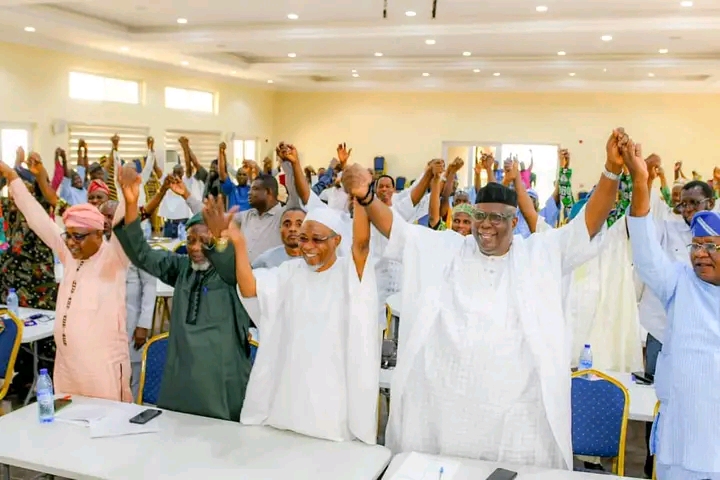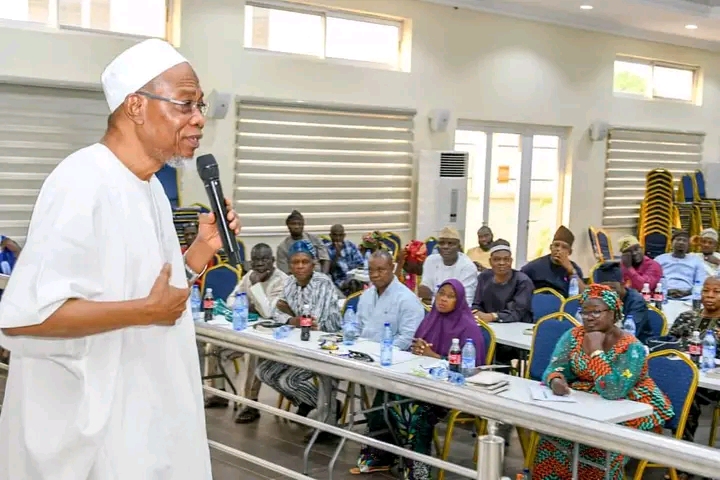BY SENATOR BABAFEMI OJUDU
- Introduction
My dear brother, Ogbeni Rauf Aregbesola, leader of this movement, the great men and women who have stood staunchly by him on this tortuous journey, and our compatriots from the grassroots of the State of Osun—yes, the State of Osun—allow me to say that only the deep can call to the deep.
Ladies and gentlemen, esteemed progressives, it is both an honor and a privilege to stand before you today. We gather not merely to reminisce but to reflect deeply on the life, work, and enduring legacy of one of Nigeria’s greatest statesmen: Chief Obafemi Awolowo. Decades after his death and more than half a century after he governed this part of our country with integrity, we still find ourselves going back to call on his ideals and ideas to inform us and direct us aright. Such is the power of visionary leadership—the type of leadership I believe all of you here today are signing up for.
Recently, in Lagos, at the home of our leader sitting here, some politicians who had wandered off in search of greener pastures returned to him, lamenting that the pasture they sought was not as green as they had imagined. His response left me deeply inspired. He told them: We are willing to have you back, but only on one condition—that you dedicate yourselves to the fight for a better society, to the building of a sane and just society. We are tired of the politics of “me and me alone.” We must return to the ways of our forebears who gave their lives to the struggle for a just society.

This philosophy, this ethos, is what has gathered us here today.
Let me share an anecdote to set the tone. Once, during a heated debate in parliament, Chief Awolowo was asked why he spent so much of his energy and resources on education when there were seemingly “more pressing issues” like roads and bridges. He replied, with characteristic clarity, “The best road to progress is the road to the mind.”
This commitment to building the “road to the mind” fascinates me and is reflected in the movement that has commenced here in Osun State. If we fail to cultivate the minds of our people and continue with the current “grab, snatch, and run” philosophy, our doom is inevitable. As pioneers of this new tendency, you have a monumental task to show good examples and to spread this gospel—like the Jehovah’s Witnesses—across our land.
- The Leadership Legacy of Chief Obafemi Awolowo
a. Visionary Leadership
Chief Awolowo was a leader ahead of his time. He envisioned a Western Region that could stand shoulder-to-shoulder with developed countries. Under his leadership, this vision manifested in groundbreaking policies and initiatives.
One of the most striking examples is the establishment of regional economic hubs and the Cocoa House, the tallest building in Africa at the time—a symbol of prosperity funded entirely by agricultural revenue.
Awolowo believed that “Leadership without vision is like a ship without a compass.” His strategic foresight allowed the Western Region to thrive while others faltered.
b. Commitment to Education
Imagine the audacity: free primary education in a region where many considered schooling a luxury! Yet, Awolowo made it happen, and the results were transformative. Within a decade, literacy levels in the Western Region soared, creating a generation equipped to lead in all fields—education, medicine, law, and beyond.
Awolowo often declared, “Any people who want to develop must educate their children.”
My late father, a product of that era, often said, “If Awolowo didn’t invest in us, we would still be waiting for a miracle to save us.” That is the enduring power of education.
c. Economic Development and Infrastructure
Under Awolowo, development was not abstract—it was visible and tangible. Roads connected towns and villages; Liberty Stadium became a symbol of excellence; industrial estates brought jobs and dignity to the people.
Awolowo once said, “Man is a bundle of needs, but his basic needs must be met first before he can aspire to higher things.”
d. Ethical Leadership
Chief Awolowo lived and governed with integrity. In an era when many saw public office as an avenue for personal enrichment, he remained above reproach. His fiscal discipline was legendary; every penny in the public treasury was accounted for.
He warned us, “A corrupt mind will always find an excuse to be dishonest.” Compare this to the rampant corruption today, where public funds are siphoned with impunity.
e. Advocacy for Federalism
Awolowo was a staunch advocate of true federalism—a structure where regions could develop at their own pace, harnessing their strengths without being stifled by over-centralization.
His writings in Path to Nigerian Freedom highlight the dangers of a unitary system masquerading as federalism. Today, the calls for restructuring echo his foresight.
- The Challenges Before Today’s Leaders in Nigeria
a. Lack of Visionary Leadership
Today, many leaders prioritize short-term gains over long-term development. The ruling philosophy today seems to be: grab power, run with it, and never tell us what you intend to do with it. What we have seen is a collection of brigands deploying power for their own aggrandizement.
b. Education Crisis
The state of education today would deeply sadden Awolowo. Public schools are underfunded, teachers are poorly paid, and students lack access to quality learning materials.
Awolowo once lamented, “The children of the poor you fail to train today will become the adults who will tear down society tomorrow.”

c. Economic Instability
Awolowo built an economy rooted in agriculture, local industry, and self-sufficiency. Today, our over-reliance on oil has left us vulnerable to global shocks.
d. Corruption and Accountability
Corruption has become so normalized that it feels like part of our political DNA. Yet, Awolowo’s example proves that ethical governance is possible.
e. Federalism and Governance
The current federal structure has led to inefficiencies and inequality. Awolowo’s vision of empowering regions to govern themselves and develop at their own pace remains a viable solution.
- Lessons from Awolowo’s Leadership for Today’s Leaders
If Awolowo were alive today, what would he tell us?
• “Plan for the long term.” Leadership demands careful planning, not charisma alone.
• “Invest in education.” An educated populace is a liberated populace.
• “Prioritize integrity.” Public office is a trust, not an entitlement.
• “Empower regions.” Let every region harness its strengths to uplift the nation.
• “Be inclusive.” Nigeria’s strength lies in its diversity.
- Conclusion: A Call to Action
As we reflect on Awolowo’s legacy, we must ask ourselves: What kind of leaders does Nigeria need today? The answer lies in the values he embodied—vision, integrity, and an unyielding commitment to the people.
Let me close with Awolowo’s immortal words:
“It is not life that matters, but the courage you bring into it.”
Nigeria stands at a crossroads. With courage, clarity of purpose, and a deep sense of responsibility, we can overcome our challenges and create a nation worthy of our children.
Thank you.
- A speech delivered in the State of Osun to members of Omoluabi Progressives .

